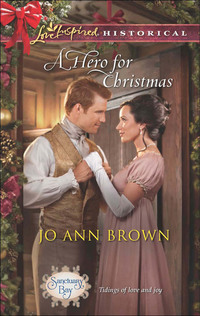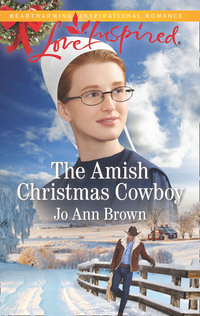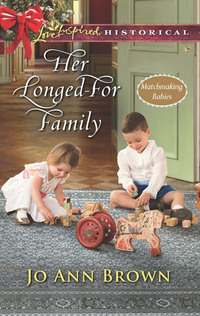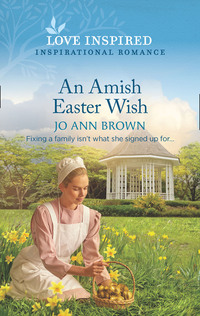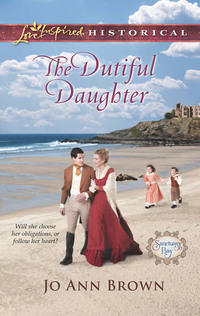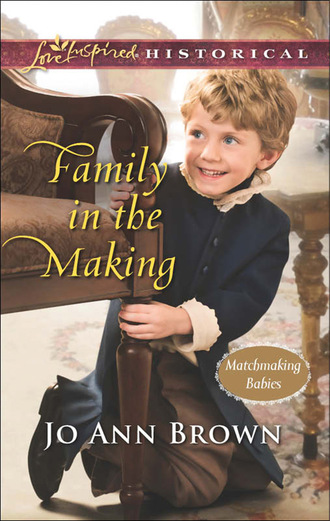
Полная версия
Family In The Making
Arthur had noticed his father’s pallor, but had not realized he had conferred with the village doctor. Up until recently, his father had worn the dignity of his age with ease. His hair, once as black as Arthur’s, was turning gray. His gout symptoms returned more frequently. In addition, life had become far more frantic in the house and Porthlowen Cove since six small children were discovered floating in a rickety boat in the harbor. The situation had grown quieter in recent weeks on the estate. The stable had been set afire by the French sailors who tried to overrun Porthlowen last month. Now those pirates were in prison. Arthur’s younger sister, Susanna, was away on her honeymoon, and the harvest was almost in on the tenant farms. All messages he had been given were on their way toward London. Everything was going as it should...
Except he had not unmasked the person who had murdered Cranny.
“Thank you, son, for agreeing to such an outlandish request,” Father said.
“Not outlandish,” came a light voice from near to the doorway, “for daughters have been asked to do much the same throughout time.”
Arthur glanced over his shoulder as his older sister, Carrie, came into the room. She was teasing, but her blue eyes, the same deep shade as his own, snapped with strong emotions. He wondered why. Had something been discovered about the baby in her arms? His sister called the youngest waif Joy. Since the children were rescued in Porthlowen Harbor, the baby had seldom been out of his sister’s arms. She was happier than she had been since her husband’s death at sea five years ago.
His siblings were, in his opinion, baby-mad. Carrie with baby Joy. His brother, Raymond, and his new wife, Elisabeth, had one of the older boys, who was close to four years old, living with them at the parsonage. His younger sister had become attached to a set of twin girls, who were a year younger.
His family had, it would appear, lost their collective minds. These children came from somewhere. They belonged to someone. Eventually they would have to be returned to those people. And the rest of his family would be lost in grief, as they had when Mama died around the same time as his brother-in-law. Arthur hated the idea of that. They had mourned enough for the past five years.
“Caroline, come and join us,” Father said with a smile.
The rest of the family used her full name, but Arthur continued to think of his older sister as Carrie, the nickname he had given her when he was young and could not pronounce her full name. She was a lovely woman who carried a bit more flesh than the ton considered acceptable. He used to tease her about being well-rounded, but he had set aside such jests years ago.
She gave Father a kiss on the cheek, then straightened. “Arthur, I had hoped to find you,” she said in that same carefree tone. “May I speak with you?” She gave the slightest nod toward the hallway.
He swallowed his sigh at another delay before he could read Gwendolyn’s message, but looked at Father. “If you will excuse me...”
“Go, go. I am sure you have many matters to consider.” His father’s smile returned.
Arthur nodded. He did have many matters he should be thinking about. On the family’s vast estate set on the sea and across the Cornish moors, there were repairs to the faulty barn roof on Pellow’s farm and the new well that must be dug before winter for the Dinases’ farm. The old one had suddenly gone dry last week. It might be because of a new tin mine being dug south along the moor, or it could be another cause completely. First, they must get a new source of water; then they could investigate why the well had dried up.
How could he think of any of that when he was curious about what Gwendolyn had written?
Carrie said nothing as they walked to the small drawing room they used en famille. French windows opened onto a terrace with a vista of the sea and the garden. The Aubusson rug with its great white roses was set in the middle of the room, and furniture was spread atop it to allow for easy conversation.
His sister sat in a chair not far from the hearth. Not that he blamed her. The fire burning there chased away the autumn afternoon’s chill. When she motioned for him to sit, he shook his head.
“I would prefer to stand...unless this conversation is going to be a long one.”
“That is up to you.” The lightness vanished from her voice, and her eyes narrowed.
“Me? You asked me to speak with you.”
“Because I am sure you have many things to say about Father’s plan that you would not in front of him.”
Arthur was not surprised that Father had discussed with Carrie the matter of a match between him and Gwendolyn. Since their mother’s death, his older sister had become Father’s sounding post.
“I never expected Father to ask this of me, Carrie.” He leaned forward and put his hands on the settee.
“It is your duty to marry.” Her voice gentled. “Father expected an announcement by the time you celebrated your thirtieth birthday.”
“I have been busy with other duties.” That was his usual excuse.
She gave him a sympathetic smile. “I know that you have been avoiding the ton since that incident with Miss Mayfield, which is why when Father told me about this arrangement he has made with Lord Monkstone, I did not say that I believed the whole of it was addled.” She looked at him directly. “Tell me, Arthur. Are you truly agreeable with this match?”
“As you said, daughters have come to terms with such arrangements for millennia.” He ran his hand through his hair, grateful that he did not have to lie.
“I know. Will you be able to ask her?”
Her question startled him. Then he reminded himself that his sister believed, as most of the world did, that he was too shy to say boo to a goose. He had never corrected the mistaken assumptions. “I would hope so. There must be some way.”
“You are resourceful, Arthur.”
“I suppose I could write a flowery poem that ends with ‘Will you marry me?’”
“Writing love missives is all well and good, but you have not made her an offer of marriage.” A smile tipped Carrie’s lips. “Don’t look surprised, Arthur. You should know that nothing stays a secret for long here, especially when you receive letters from her week after week.”
He hoped his sister was wrong, because no one else must learn how he had assumed Cranny’s secret duties. As long as everybody believed the notes were focused on avowals of love, his secret should be safe.
“I know you probably find it simpler to put words on paper than to speak them,” Carrie said, “but even if you propose via a love poem, you still must say ‘I do’ at the front of the church.” She reached out and patted his hand. “But let us take one step at a time. There must be some way to make it easy for you to propose to Lady Gwendolyn.” She rose and began to pace in front of the French windows. When the baby began to fuss, she paused. “I must take Joy to be fed. Oh!”
“Oh?” he asked.
“It is simple. Why didn’t I see that before?” She crossed the room and placed the baby in his arms.
He tensed, because he had never held such a tiny infant. His nose wrinkled at the odor of a dirty, wet napkin. “Carrie, I am not accustomed to little babies.”
“I know. The practice will do you good, especially because Lady Gwendolyn’s younger child isn’t much older than Joy.” Carrie’s eyes filled with tears. “How sad to have a child born after the death of its father.” She squared her shoulders, all business once again. “The other is about three or four years old. My advice to you is to get those children to like you, so she will see you are sincere even if you are hesitant when you ask her.”
“Why?”
“The quickest way to a woman’s heart is to win the hearts of her children.”
He did not say that hearts had nothing to do with the arrangement he and his father had discussed. Something twinged in his chest. Regret? He disliked the idea of a loveless match.
The baby grumbled and wiggled. He shifted her so he would not drop her. As he looked down at her tiny rosebud mouth, he asked, “And how do you suggest I win over her children?”
“Play with them. Talk to them.”
“I honestly don’t know much about children.”
“Then learn.”
“You make it sound easy.”
Carrie grinned. “Isn’t it? There are five small children living under our roof and another staying with Raymond and Elisabeth at the parsonage. Why not practice with them?”
“I would not know where to begin.” Or when I would have the time. If Gwendolyn’s message requires me to travel, I must take my leave immediately. He yearned to tell Carrie the truth, but bit back the words.
She stepped behind him and put her hands against his back. Giving him a slight push, she said, “Start with the expert. Ask Miss Oliver. She will be glad to help, especially after you gallantly rescued her this afternoon.”
Glancing over his shoulder, he chuckled. “You heard of that.”
“Even if the sound of crates falling had not resonated through Cothaire, do I need to remind you that nothing stays secret here?” Not giving him a chance to reply, she said, “Will you ask for her help?”
“Yes.” He would have to find a way to balance his sister’s request with his other tasks.
“Off with you then. Joy needs to be fed, and taking her to the nursery gives you the perfect opportunity to speak with Miss Oliver.”
He walked to the door. Another delay before he could read the note after he deciphered it, but the visit to the nursery could be done quickly. He would go through the motions of spending time with the children so Carrie did not become suspicious. Once he had a chance to read Gwendolyn’s message, he would know what he needed to do next. Going to the nursery would not take much time.
And he could see Miss Oliver again to assure himself that she had recovered from the fright of the boxes falling on them. He would give her the baby, ask for her help to convince his family he was making an effort to be a good suitor for Gwendolyn, and then retreat to his private rooms to read Gwendolyn’s message. What could be simpler than that?
Chapter Two
“Look! Look! Look!”
Maris smiled at the children as she selected one of the storybooks on the shelf in the Cothaire day nursery. It was their favorite book. She wanted to read it to them before their tea was brought up, along with four of the child-size cups that had survived falling off the shelf. Eight were usable, and two more were being glued together. The rest had smashed into too many pieces to try to repair.
Putting the book under her arm, she went to where Gil and Bertie pointed out the window overlooking the harbor. She knelt on the padded bench there and shaded her eyes as she scanned the waves, which glittered like dozens of fabulous diamond necklaces.
“I see it,” she said, when she realized the little boys were gesturing toward the sails of a ship far out near the horizon. Bertie was, by her estimation, at least four years old, while Gil probably had his third birthday not too long ago.
“Cap’s?”
Before she could answer Bertie, the three-year-old twin girls who had been playing with dolls by a large dollhouse repeated, “Cap?” They jumped to their feet and ran to the window. “Cap’s boat?”
“No,” Maris said, shifting to give Lulu and Molly, the twins, room to get on the bench. She hated dashing the children’s hopes. They missed Captain Nesbitt, who had rescued them from Porthlowen Harbor, but he was not due back for at least another fortnight.
“No Cap’s boat. No Cap for Wuwu.” Lulu’s lisp mixed with her mournful tone.
“But it is a pretty ship.” Maris stood to give the girls more room.
The four youngsters plus baby Joy kept her busy. On occasion, Toby, the sixth child from the jolly boat that had drifted into Porthlowen Harbor, came to play with the others. He was close to Bertie’s age. Parson Trelawney and his wife had offered to take the little boy the first night, when Toby and Bertie would not stop annoying each other. That temporary solution had become permanent...or permanent until the truth about the children could be uncovered.
Maris watched the children, who chatted excitedly about the ship and what might be on it and where it might be bound.
“Ship go bye-bye.” Lulu’s voice was sad.
“Bye-bye, ship,” echoed her twin.
Maris sat beside them and held out her arms. The children nestled next to her, and she drew them closer. Talking to them about the day they had toured Captain Nesbitt’s ship while it was being repaired in the harbor, she was glad to see their sweet smiles return.
Who had abandoned these children in a jolly boat that was ready to sink? If Captain Nesbitt and his first mate had failed to see them and come to their rescue, the children could have been dashed upon the rocks in the cove. Whose heart was so unfeeling? As she stroked the silken hair on their tiny heads, Maris wondered why someone had put them in that boat. The children were too young to explain, and every clue had led to a dead end.
“Shall we sing a song about a ship?” she asked, grateful that, no matter how they had come to Cothaire, they were safe.
The two boys began singing. The tune did not resemble the one she had taught them and half the words were wrong, but their enthusiasm was undeniable.
They broke off as footsteps came toward the nursery. Strong, assertive footsteps. The servants were quiet when they walked through the house. Maybe the parson was bringing Toby to play with the children.
Hushing them, Maris disentangled herself and eased out from among them. She brushed her hair toward her unflattering bun as she stood. She opened her mouth, but then realized the silhouette in the doorway was taller than the parson or his wife.
“Miss Oliver?” asked the Earl of Launceston’s older son. He stood as stiff as a soldier on parade.
“Lord Trelawney,” she squeaked, sounding as young as her charges.
What was he doing here, so soon after the mishap in the stillroom? In the weeks since her arrival at Cothaire, the viscount had never come to the nursery. Not that she had expected him to, because his duties lay elsewhere. Still, it had seemed odd, when everyone else in the family, including the earl, had stopped in once or twice to ask how the children fared.
Uneasiness tightened Maris’s stomach. Had the viscount come to dismiss her? She could have misread his concern for her well-being. She had been wrong about men before, terribly wrong.
Could it be almost a year ago when she had made her final visit to her friend Belinda, the daughter of an earl? Because Maris’s father was a country squire whose tiny estate bordered Lord Bellemore’s vast one in Somerset, the two girls had spent many hours together as children. As they grew older, they had less in common, but after Maris’s parents died, Belinda had invited her to stay. Her widowed father often needed another female to even the numbers at the table. Dear Belinda was oblivious to the disapproving glances in Maris’s direction, but Maris had been aware of each one from the earl’s other guests.
If she had not offered to get a familiar title from the earl’s book room to read her friend to sleep that evening...
Maris wrapped her arms around herself, holding herself together. It would be easy to fall apart whenever she thought of Lord Litchfield and what he had done. No! She was safe at Cothaire.
Or was she? The nursery was on the upper floor where few adults came. Lord Trelawney would know that she was alone.
Stop it! If you offend him by accusing him falsely, he will dismiss you without a recommendation to help you get another position. Not that she had been unable to solve that problem in getting her current position, but she might not find another household with such a need for a nurse that they gave the fake recommendation she had penned herself such a cursory examination. Familiar guilt at her lie pinched her, but she had been desperate.
“Some help, please,” Lord Trelawney said in his rich, baritone voice.
Astounded, she realized he carried Joy— awkwardly, as if he feared he might drop the infant at any moment. “I will take her. Thank you.”
Little Gil raced after her, crying with excitement, “My baby! My baby!” No one knew if Gil and Joy were actually brother and sister, but the little boy had laid claim to the baby after being rescued.
Maris calmed him and the other children, who clustered around her and the viscount. She held out her arms and repeated, “I will take her, my lord.”
“May I...?” He glanced at the children and cleared his throat. “May I come in?”
Every instinct urged her to say no, but she really had no choice. She put space between them, herding the children away from the doorway. They wanted to greet Lord Trelawney with the same enthusiasm they showed everyone, but she doubted the cool, composed man would welcome their curious questions or their fingerprints on his pristine black coat. As he came into the room, she stepped around the small table where the children ate. It was not much of a shield, but it was all she had.
You are being silly, that soft voice whispered in her mind. Lord Trelawney is not Lord Litchfield. He has never been anything but polite when he passed you in an empty hallway. And he did save you from injury earlier.
Maybe so, but she would not take the chance of being hurt by another man and then abandoned by those she thought she could depend on.
“Will you...?” He motioned with his head toward the baby.
“Certainly.” She left her scanty sanctuary and scooped Joy into her arms, then wrinkled her nose. “She is rather pungent, isn’t she?”
He glanced down at his sleeve where a damp spot warned that the napkin had leaked. “Yes.”
“I shall see that she is changed and fed, my lord. Thank you.” The nursery seemed oddly cramped with him in it. Or maybe it was because the children gripped her skirt, making it impossible for her to edge away again. “I assumed Lady Caroline would bring Joy to the nursery.”
“Yes, my sister seldom is parted from this baby. I hope...” He did not finish.
He did not need to, because Maris understood. Lady Caroline would be bereft when the baby’s parents were found.
“You look well, Miss Oliver,” he added.
She was startled, then realized he must be referring to what had occurred in the stillroom. “Thanks to you.” She lowered her eyes. “I hope your injury was minor.”
“How did you know?”
“We were standing close, and I felt you flinch as the debris flew about.”
He smiled. “’Tis a scratch.” He paused for so long that she thought he was done; then he said, “I appreciate you asking.”
Laying the baby on the higher table, where a stack of fresh napkins waited, Maris began to change Joy. She was aware of Lord Trelawney behind her, even though he was silent. After sending the children to play, she looked at him.
“Is there something else you need me to do, my lord?” she asked.
“’Tis my sister. She thought it was time that I visited the nursery and learned more about the children living here.”
“She did?” What a peculiar suggestion! In an upper-class home such as Cothaire, the children’s lives seldom intersected with their elders’. “Of course, you are always welcome.”
“She suggested that... That is, she thought you might guide me in getting to know the children better.” He glanced at where the twins were chasing the boys. “Next month, I will be spending time with a widowed acquaintance who has two children of her own, and Carrie thought if I learned about these children, I would have an easier time with meeting Gwendolyn’s.”
Maris put a clean napkin on the baby and pinned it in place. It would seem that Lord Trelawney had made his choice of a bride. She had heard the household staff discussing whom he might choose and how his new wife might change Cothaire. No doubt the widow’s name was being discussed in whispers in the servants’ hall.
Lifting little Joy from the table, Maris cradled her close to her heart. The baby’s mouth tasted the air, a sign that she wanted to nurse. Maris watched Lord Trelawney gaze down at the child. He lightly touched her soft hair, his expression unguarded for a moment.
Biting her lower lip, Maris said nothing. If she expressed how endearing it was to see the oh-so-correct viscount reveal a tender vulnerability, she might embarrass him. She did not move as he looked from the baby to the other children, his thoughts bare on his face. He was perplexed by them, but fascinated, too. Few strong men would reveal that, nor would they be concerned about the well-being of a servant who had caused an accident in the stillroom.
As he gently brushed the baby’s head, he looked up. His gaze caught Maris’s, no longer cool, but filled with emotions she could not interpret. Standing with the baby between them, she noticed, as she had not before, that darker navy rings encircled the pale blue of his eyes. She never had seen any like them. Her fingers tingled, and she had to fight to keep them from rising to curve along his cheek as she told him how sweet she found him to be with the baby. Being so bold might suggest she was the easy type of woman Lord Litchfield considered her.
That thought compelled Maris back a half step. “Lord Trelawney, we can discuss how you can get to know the children better once I take Joy to the wet nurse. She is waiting in the kitchen.”
His hand hung in the air now that Joy’s head was no longer beneath it. He lowered it. “I should go. I need to—”
The other children shrieked as they raced from one side of the room to the other, giggling.
“I will be but a moment.” Maris pointed to each child and spoke his or her name, before adding, “Children, this is Lord Trelawney. He is Lady Susanna’s older brother. Just like Parson Raymond.”
They smiled at him, but uneasily, then looked at her. Had they sensed, as she did, that he wished he were somewhere else? With a sigh, she suggested they go to the window to see what else they might spot outside. They clambered onto the window bench. She hoped they would remain distracted and well behaved until she returned.
She lowered her voice as she turned to the viscount. “Watch so they don’t get hurt. I shall be right back.” She hurried to the stairs leading down to the kitchen, before she laughed out loud at Lord Trelawney’s expression.
He had looked unnerved at her suggestion that he stay alone with the children. Could he truly have no experience with little ones? Lady Susanna was more than a decade younger than he was, so he must remember her as an infant and toddler. Then Maris remembered that Belinda’s brother had been sent away to school by the time he was ten. Most likely, Lord Trelawney had been attending boarding school when Lady Susanna was born.
In the kitchen, Maris handed Joy to the young woman who came from the village several times each day to nurse the baby.
Mrs. Ford looked up from stirring a bowl. “Miss Oliver, I cannot believe you left those young ones on their own upstairs. That is not like you.”
“I didn’t leave them alone,” she said.
“Lady Caroline has more important—”
“I did not leave them with Lady Caroline.”
She had the attention of everyone in the kitchen, and one of the maids blurted, “Then who?”
“Lord Trelawney.”
Gasps rushed around the kitchen, quieting when Mrs. Ford gave her staff a frown. Putting down the bowl, the cook wiped her hands on her apron as she walked over to where Maris stood with her foot on the first step of the nursery stairs.
Too low for anyone else to hear, the cook asked, “Is this a jest?”
“No.” Maris could trust Mrs. Ford, who had begun her service at Cothaire before Maris was born. “Lady Caroline suggested he get to know these children better before he meets the children of a lady named Gwendolyn next month.”
“Ah.” The cook smiled. “Thank God! Lord Trelawney is going courting.”






